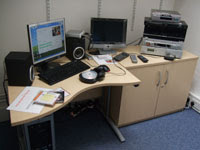Tuesday 22nd
More 4 - Encounters at the End of the World - "Showing in the True Stories strand, Werner Herzog's Oscar-nominated film finds the legendary director in Antarctica.
At McMurdo Research station he meets the scientists, researchers and workers who inhabit a remote, almost magical world. He follows both the divers below the ice and the vulcanologists into the mouths of active volcanoes but he also finds the eccentrics who make up this diverse community.
Among them are a former banker who now drives a huge truck, a plumber who claims to be descended from the Aztec kings and a female researcher whose turn at the camp's talent show is to fold herself into a suitcase.
Beautifully shot, with jaw-dropping underwater sequences, Encounters... is Herzog at his observational best."
Saturday 26th
BBC 2 - Hamlet - "Actor David Tennant has signed up to reprise his role as Hamlet for BBC Two.
The Doctor Who star recently completed a stint playing the prince on stage as part of a Royal Shakespeare Company production.
He will be joined by all of the key members of its original cast, including Star Trek actor Patrick Stewart, who plays Claudius.
Last week Tennant finished filming his farewell Doctor Who episodes, which will be shown later this year.
He announced he was leaving the popular BBC show last year at the National Television Awards.
BBC Two controller Janice Hadlow said the 180-minute screen production of Hamlet was "a wonderful opportunity... to bring one of the great stage successes of last year to a wider audience".
Sunday 27th
Channel 4 - Tsunami: Where Was God? - "Taking as his subject the Indian Ocean tsunami of Christmas 2004, former Dominican Friar Mark Dowd confronts a question that has troubled religious thinkers for centuries: how can belief in a benevolent God be reconciled with natural disaster?
In an attempt to answer this thorniest of questions, Dowd sets off on a deeply personal journey to the region to meet people affected, as well as speaking to leading figures from some of the region's religions, to ask where 2004's events leave faith in God. The question of how to reconcile a loving God with human suffering plagued Dowd in his own theological studies, but the tsunami's deadly force - as well as subsequent events in Pakistan and New Orleans - demands an answer even more forcefully.
Travelling through the disaster zones in Thailand, India and Indonesia, Dowd meets many people who lost their entire families. How can faith survive such an immense test?
He talks to leading Buddhists, Hindus, Muslims and Christians to explore theological explanations for Man's suffering. Many people believe that these events are simply the will of God, Karma or divine retribution.
But Mark wants to find an answer that satisfies deeper spiritual questions. He turns to leading theologians and religious thinkers meeting at the Vatican Observatory for enlightenment and meets the arch-sceptic Professor Richard Dawkins."
* This applies to staff members and students at the University of Gloucestershire only. Any recordings made are to be used only for educational and non-commercial purposes under the terms of the ERA Licence.
